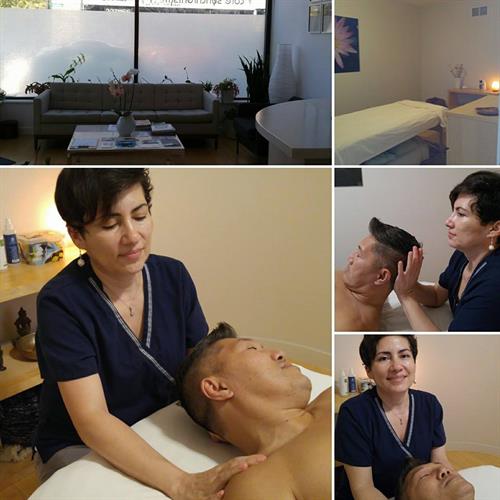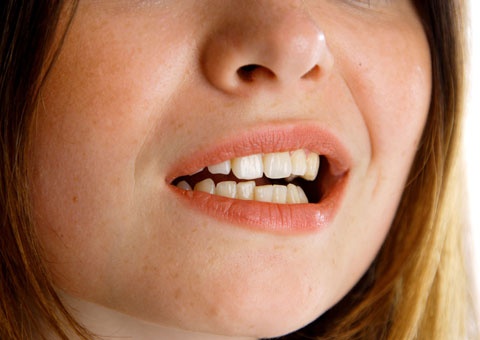The habit of grinding, gnashing, grating, or clenching the teeth is called bruxism, and millions of adults and children are affected by this condition. I know bruxism well, providing therapy to alleviate and normalize the muscles of the jaw for my clients and with my own personal experience with it.
Bruxism can occur as a response to increased psychological stress to the body or being distorted with a chronic forward head posture. Many people may not even be aware that they have this condition because they grind their teeth at night while asleep but it also can occur during day as well.
Physical symptoms: headache, temporomandibular joint (TMJ) discomfort and muscle aches, facial myalgia (muscle pain), ear ache, tightness and stiffness of the shoulders, limitation of mouth opening and sleep disruption. Oral symptoms: abnormal tooth wear, fracture of the teeth, inflammation and recession of the gums, excess tooth mobility and premature loss of teeth.
Tips to help you stop teeth grinding include:
- Avoid or cut back on foods and drinks that contain caffeine, such as colas, chocolate, and coffee.
- Avoid alcohol. Grinding tends to intensify after alcohol consumption.
- Do not chew on pencils or pens or anything that is not food. Avoid chewing gum as it allows your jaw muscles to get more used to clenching and makes you more likely to grind your teeth.
- Train yourself not to clench or grind your teeth. If you notice that you clench or grind during the day, position the tip of your tongue between your teeth. This practice trains your jaw muscles to relax.
- Relax your jaw muscles at night by holding a warm washcloth against your cheek in front of your earlobe.
- An assessment and a couple of structural balance therapy sessions to get to the root of the problem and preventing it from getting worse.
Other therapies to consider, according to the Bruxism association “Psychoanalysis, autosuggestion, hypnosis, progressive relaxation, meditation, selfmonitoring, sleep hygiene and habit reversal/habit retaining have been prescribed for the management of bruxism.”
Using a night guard doesn’t get to the root of the problem. Malocclusion (improper alignment of the teeth) may also play a causative role or may determine the severity of symptoms  related to bruxism. I see many clients with this condition in my practice. Night guards may help protect the tooth enamel from damage but it never really keeps you from clenching, or otherwise addresses any bio-mechanical or neurological causes. Stress, poor posture (like ‘text neck’), weak core muscles can cause the head and neck muscles to become over tight and painful. — all things that can be corrected with proper evaluation and care!
related to bruxism. I see many clients with this condition in my practice. Night guards may help protect the tooth enamel from damage but it never really keeps you from clenching, or otherwise addresses any bio-mechanical or neurological causes. Stress, poor posture (like ‘text neck’), weak core muscles can cause the head and neck muscles to become over tight and painful. — all things that can be corrected with proper evaluation and care!
What you didn’t know
Snoring is not an illness, but it can be a symptom. Certain sleep disorders like snoring are accompanied by bruxism often occurs with obstructive nasal and breathing symptoms. Research has consistently found that bruxism is found more frequently in those individuals who have an existing sleep disorder such as snoring, breathing pauses during sleep and Obstructive Sleep Apnoea (OSA). Sleep disorders shouldn’t be taken lightly bruxists and tooth grinders also reported sleep talking, violent or injurious behaviours during sleep, sleep paralysis, hypnagogic/hypnopompic hallucinations (semi-consciousness between sleep and wake) are also more frequently reported by bruxists and tooth grinding individuals.
Other causes that may not be familiar: Due to stress some people tend to leach minerals faster than the average person and need to replenish their minerals. The lack of, or imbalance of, the combination of Nutrients Required for health and healing, particularly calcium and magnesium and other important minerals plus drinking alcohol and taking certain medications (for example, antidepressants) may worsen bruxism. Parasites, yes I know how can that be but statistics on parasitic infections are pretty staggering; according to the World Health Organization, approximately 3.5 billion people suffer some type of parasitic problem, and not all these people live in poorer countries.
Did you know if teeth grinding and clenching (bruxism) can develop into something worse. Temporomandibular joint (TMJ) syndrome is a disorder of the jaw muscles and nerves caused by injury to the temporomandibular joint.
Are you at risk of this chronic condition? The check list is:
Poor posture in the neck and upper back muscles may lead to neck strain and abnormalities of jaw muscle function.
Stress increases muscle tension and jaw clenching.
Women between 18 to 44 have increased risk.
Chronic inflammatory disorders and painful musculoskeletal conditions.
People with jaw trauma or poorly positioned teeth.
People who have a genetic predisposition to pain sensitivity and increased stress responses.
Symptoms of TMJ syndrome tend to be episodic and related to stress and lifestyle. Often symptoms can be prevented using self-care at home, such as
- eating soft foods
- avoiding chewing gum
- maintaining proper posture
- practicing stress reduction and relaxation techniques
- using dental splint appliances as recommended by a jaw care professional
- while exercising, working, or participating in sports, using proper safety equipment to prevent jaw fractures and dislocations
Habitual snoring and sleep bruxism in a paediatric outpatient population in Hong Kong
Management and Treatment of Temporomandibular Disorders: A Clinical Perspective

